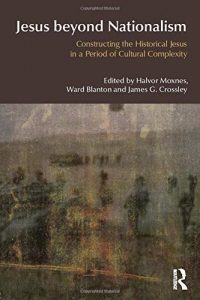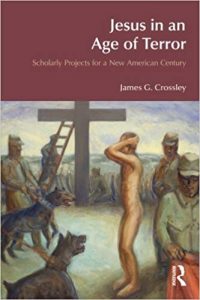James G. Crossley, autor do biblioblog Earliest Christian History, é Professor de Novo Testamento no Departamento de Estudos Bíblicos da Universidade de Sheffield, Reino Unido. Dois futuros lançamentos do autor chamam a atenção, especialmente o segundo, que trata das tácitas posturas políticas e ideológicas dos exegetas no estudo de Jesus e dos primeiros cristãos e sua relação com a atual política Ocidental – especialmente a Anglo-Americana – para o Oriente Médio.
No primeiro, Crossley escreve apenas um capítulo, pois o livro tem vários autores. Mas, no segundo, o trabalho é todo seu. Uma proposta ambiciosa.
BLANTON, W.; CROSSLEY, J. G.; MOXNES, H. (eds.) Jesus beyond Nationalism: Constructing the Historical Jesus in a Period of Cultural Complexity. London: Equinox Publishing, 2008, 256 p. – ISBN 9781845534103 (Hardback) 9781845534110 (Paperback).
Diz a editora Equinox:
 The link between historical Jesus studies and the broader cultural contexts has been largely lost in contemporary scholarship, with the heritage of the Jesus scholarship from the nineteenth century being detached from its cultural context and with the history of Jesus scholarship being buried as a topic in the development of methods and issues in New Testament studies. As a result most presentations of the historical Jesus are historiographically and hermeneutically naïve, assuming an ‘objective’ posture, with little or no reflection on their ideological presuppositions. Therefore, consciously or unconsciously, they often represent hegemonic positions. This collection of essays starts from a different position, by questioning the use of presentations of Jesus to defend and protect hegemonic or mono-cultural contexts, and thereby explicitly or implicitly favour a development towards a more inclusive society for persons from different ethnic, racial, national, gender and sexual orientation backgrounds. This collection of essays will look at the cultural and ideological beginnings of historical Jesus studies in the nineteenth century and expose the underlying presuppositions of hegemony in contemporary presentations of Jesus, viewed from the perspective of ‘cultural complexity’.
The link between historical Jesus studies and the broader cultural contexts has been largely lost in contemporary scholarship, with the heritage of the Jesus scholarship from the nineteenth century being detached from its cultural context and with the history of Jesus scholarship being buried as a topic in the development of methods and issues in New Testament studies. As a result most presentations of the historical Jesus are historiographically and hermeneutically naïve, assuming an ‘objective’ posture, with little or no reflection on their ideological presuppositions. Therefore, consciously or unconsciously, they often represent hegemonic positions. This collection of essays starts from a different position, by questioning the use of presentations of Jesus to defend and protect hegemonic or mono-cultural contexts, and thereby explicitly or implicitly favour a development towards a more inclusive society for persons from different ethnic, racial, national, gender and sexual orientation backgrounds. This collection of essays will look at the cultural and ideological beginnings of historical Jesus studies in the nineteenth century and expose the underlying presuppositions of hegemony in contemporary presentations of Jesus, viewed from the perspective of ‘cultural complexity’.
Contents (Sumário)
1. Ward Blanton, James G. Crossley, and Halvor Moxnes, ‘Introduction’
2. Thomas Hylland Eriksen, ‘What is cultural complexity?’
3. Halvor Moxnes, ‘What is it to write a biography of Jesus? Schleiermacher’s Life of Jesus and 19th century nationalism’
4. Peter Normann Waage, ‘Dostoyevsky and the Russian Christ’
5. Hugh Pyper, ‘Why Jesus was not a Scot: Herder, central European nationalism, and the Aryan Christ’
6. Ward Blanton, ‘Schweitzer’s Jesus, the crisis of modernism and beyond’
7. Leif E. Vaage, ‘Beyond nationalism: Jesus the “Holy Anarchist”?’
8. William E. Arnal, ‘Jesus as Battleground in a Period of Cultural Complexity’
9. James Crossley, ‘Jesus the Jew since 1967’
10. Oddbjørn Leirvik, ‘Jesus in modern Muslim thought: from anti-colonial polemics to post-colonial dialogue?’
CROSSLEY, J. G. Jesus in an Age of Terror: New Testament Projects for a New American Century. London: Equinox Publishing, 2009, 256 p. – ISBN 9781845534295 (Hardback) 9781845534301 (Paperback).
Diz a editora Equinox:
 This book will apply the work of Noam Chomsky, Edward Herman, Edward Said and several others on international politics and the supportive role of the media, intellectuals and academics to contemporary Christian origins and New Testament scholarship. Part One will look at the ways in which New Testament and Christian origins scholarship has historically been influenced by its political and social settings over the past hundred years or so. Moving on to the present, the following chapter will then apply Herman and Chomsky’s propaganda model of manufacturing consent in the mass media to the recent explosion of biblical scholars writing on the internet, in particularly ‘biblio-bloggers’. It is clear that political views in ‘biblio-blogging’ conform strikingly to the emphases that come through in Herman and Chomsky’s analysis of the mass media and intellectuals, particularly with the standard lines on the ‘war on terror’ and views on the contemporary Middle East. The rest of the book will take up modified key areas of the propaganda model in more detail.
This book will apply the work of Noam Chomsky, Edward Herman, Edward Said and several others on international politics and the supportive role of the media, intellectuals and academics to contemporary Christian origins and New Testament scholarship. Part One will look at the ways in which New Testament and Christian origins scholarship has historically been influenced by its political and social settings over the past hundred years or so. Moving on to the present, the following chapter will then apply Herman and Chomsky’s propaganda model of manufacturing consent in the mass media to the recent explosion of biblical scholars writing on the internet, in particularly ‘biblio-bloggers’. It is clear that political views in ‘biblio-blogging’ conform strikingly to the emphases that come through in Herman and Chomsky’s analysis of the mass media and intellectuals, particularly with the standard lines on the ‘war on terror’ and views on the contemporary Middle East. The rest of the book will take up modified key areas of the propaganda model in more detail.
Part Two will look at the Orientalist rhetoric of clashing civilisations and how this relates to the ‘war on terror’ and the creation of Islam, Arabs, Middle East etc. as the Great Enemy in the media and relevant intellectual thought since the 1970s and, to use Derek Gregory’s phrase, ‘hideously emboldened’ in the ‘war on terror’. The next chapter will then show how this context has had a highly noticeable impact on the use of social sciences in New Testament and Christian origins scholarship, in particular the stark generalisations of scholars using cultural/social anthropology based on contemporary studies of ‘the Middle East’. Disturbingly, some of this scholarship has many rhetorical links with Anglo-American foreign policy interests in the Middle East and beyond, making some politically charged statements that cohere closely with recent intellectual defences of actions in Iraq, Palestine and beyond.
Part Three will look at issues of Palestine and Israel in the media alongside Christian, secular and relevant intellectual thought since the ‘Six Day War’ of 1967, focusing in particular on the dramatic shift towards widespread support for Israel. This will also include an analysis of the recent and controversial case of Nadia Abu el-Haj’s tenure at Barnard. The following chapter will show how this interest in Israel has had a profound impact on historical Jesus and Christian origins studies, particularly the strange emphasis on ‘Jewishness’ and misplaced allegations of ‘antisemitism’ since the 1970s. It will also be seen that despite the shift in support of Israel this is rarely done for love of Jews, Judaism, Israel or Israelis because there remains a notable cultural, political and religious superiority in Anglo-American scholarship. While owing much also to an Orientalist tradition, this too is strongly echoed in scholarship of Christian origins where, for all the emphasis on the ‘Jewishness’ of Jesus and the first Christians, it is extremely common to find Jesus or the first Christians being ‘better than’ Judaism or overriding key symbols of Judaism as constructed by scholarship, done, ironically, by frequent ignoring of relevant Jewish texts. The end results of contemporary scholarship are not dramatically different from the results of the anti-Jewish and antisemitic scholarship of much of the twentieth century.
Contents (Sumário)
Preface
Part I: Christian Origins and New Testament Studies in Ideologically and Historically Contaminated Contexts
Chapter 1: Introduction: Reading the History of New Testament and Christian Origins Scholarship
Chapter 2: The Politics of the Bibliobloggers
Part II: Neo-Orientalism: Orientalism, Hideously Emboldened
Chapter 3: The Context: A Clash of Civilisations?
Chapter 4: Anglo-American Power and Liberal Scholarship: Scholarly Reconstructions of the Social World of Christian Origins
Part III: ‘Jewishness’, Jesus and Christian Origins since 1967
Chapter 5: The Context: Judaism and Christianity; Israel and the West
Chapter 6: Jewish…but not that Jewish
Conclusions

Thanks for the notice. Apologies for English. The subject matter of the book makes this more shameful!